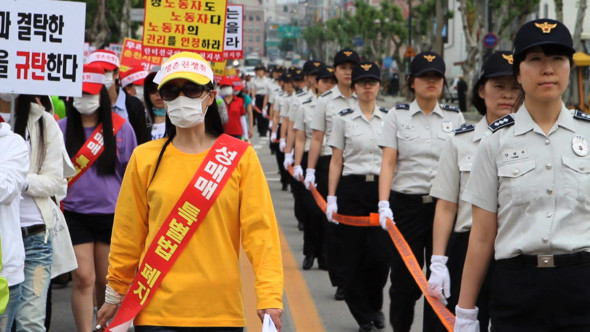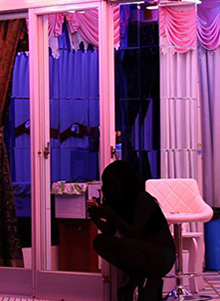Combining documentary with experimental video, Grace Period documents the activities of women sex workers in the Yeongdeungpo red-light district in Seoul, South Korea.

Facing constant police crackdowns and the threat of permanent closure following the closeding of a massive shopping complex adjacent to their workplaces, the women of Yeongdeungpo band together in protest. Archival footage, mostly shot by the women themselves, show their collective efforts as they organize with other sex workers from brothels across the country. In creative and daring acts of resistance, they launch a series of demonstrations that trace a lineage to Korea’s democratic union movements of the 1980s– denouncing the government and corporate interests, demanding decriminalization, and declaring their rights as workers. Their activism is placed into relief against scenes of the night-to- night demands upon the women while at work in the brothel storefronts, or “hallboxes”.
Waiting for customers within these brightly lit arenas awash in neon and candy colors, the women, specifically their bodies, are the hypervisible obverse of their pariah status—desired, yet unwanted. Careful to avoid reinscribing the women with such stigma, the filmmakers utilize digital effects to manipulate the images of them. This effect, called “rotoscoping”, took the efforts of four animators, working over the span of a full year, to create by digitally tracing and animating the women’s figures frame by frame. The results are flickering silhouettes designed to protect the privacy of the women, while underscoring their status as precarious workers. Together, these scenes of activism and labor work in tandem to reveal the specificities of these women’s struggles within ubiquitous conditions of debt, caring labor, the gendering of that labor, and institutional and state violence.
 Caroline Key is a Korean-American filmmaker and video installation artist based in Brooklyn, NY. She received her MFA in Film/Video from the California Institute of the Arts, her BFA from the School of the Art Institute of Chicago, and was an participant in the Whitney Independent Study Program. Her works employ a range of cinematic practices- 16mm film, alchemical film processing, documentary, animation, and digital graphics. These films and videos investigate the construction and negotiation of identities rooted in conditions of alterity. Her works have shown internationally at festivals and galleries, including Arsenal Cinema in Berlin, the Smithsonian Hirshhorn Museum, and the New Museum in New York.
Caroline Key is a Korean-American filmmaker and video installation artist based in Brooklyn, NY. She received her MFA in Film/Video from the California Institute of the Arts, her BFA from the School of the Art Institute of Chicago, and was an participant in the Whitney Independent Study Program. Her works employ a range of cinematic practices- 16mm film, alchemical film processing, documentary, animation, and digital graphics. These films and videos investigate the construction and negotiation of identities rooted in conditions of alterity. Her works have shown internationally at festivals and galleries, including Arsenal Cinema in Berlin, the Smithsonian Hirshhorn Museum, and the New Museum in New York.
 KIM KyungMook was born in Busan, South Korea, in 1985 and went to Seoul at the age of sixteen. From the year 2001 to 2004, with the pen name Kyum, he worked as a journalist and a columnist for publications, including Hankyoreh and Outsider. In 2006, he was on the editorial board of Korea’s only independent film magazine, Independent Film. In 2011, he was a committee member of the Association of Korean Independent Film and Video. KyungMook has produced and directed five feature length films. His films have screened internationally and have won several awards. He was the youngest Korean filmmaker ever to be accepted into the Venice Film Festival with his third feature film, Stateless Things. There have been retrospectives of his work in South Korea, Taiwan, France, and Switzerland.
KIM KyungMook was born in Busan, South Korea, in 1985 and went to Seoul at the age of sixteen. From the year 2001 to 2004, with the pen name Kyum, he worked as a journalist and a columnist for publications, including Hankyoreh and Outsider. In 2006, he was on the editorial board of Korea’s only independent film magazine, Independent Film. In 2011, he was a committee member of the Association of Korean Independent Film and Video. KyungMook has produced and directed five feature length films. His films have screened internationally and have won several awards. He was the youngest Korean filmmaker ever to be accepted into the Venice Film Festival with his third feature film, Stateless Things. There have been retrospectives of his work in South Korea, Taiwan, France, and Switzerland.
 Rosa Cho is a counselor/advocate at the Sex Workers Project. She was previously policy and research analyst at Re:Gender (formerly National Council for Research on Women) and a Ralph J. Bunche fellow at Amnesty International USA. Rosa has extensive experience in women’s rights advocacy and violence against women and has worked as a direct service worker as well as a researcher. Currently, she teaches and is a doctoral candidate at NYU Silver School of Social Work. When she is not working or teaching, she’s busy studying martial arts, yoga, and dancing.
Rosa Cho is a counselor/advocate at the Sex Workers Project. She was previously policy and research analyst at Re:Gender (formerly National Council for Research on Women) and a Ralph J. Bunche fellow at Amnesty International USA. Rosa has extensive experience in women’s rights advocacy and violence against women and has worked as a direct service worker as well as a researcher. Currently, she teaches and is a doctoral candidate at NYU Silver School of Social Work. When she is not working or teaching, she’s busy studying martial arts, yoga, and dancing.







